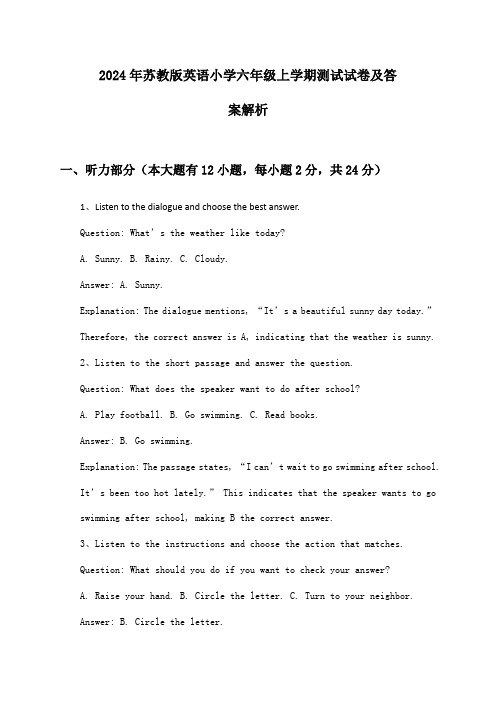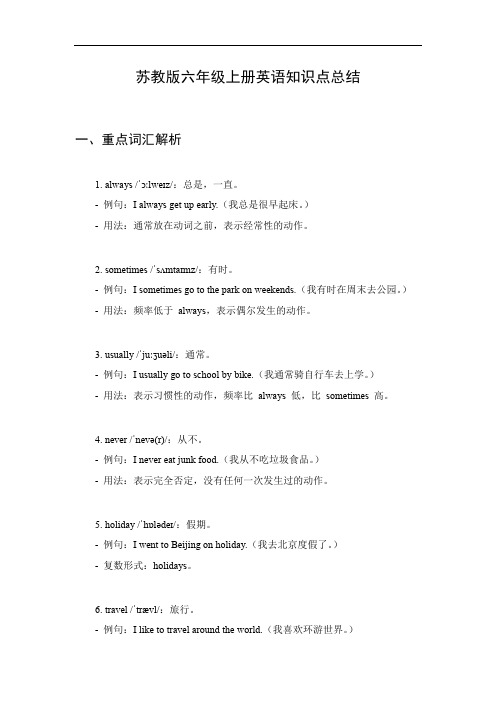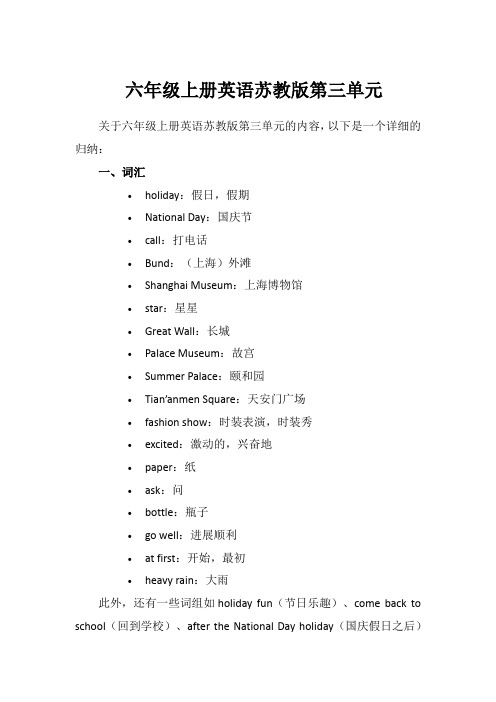苏教版六年级英语
苏教版六年级上册英语语法知识点

苏教版六年级上册英语语法知识点苏教版苏教版苏教版苏教版六年级上册英语语法知识点 4 3 2 11. 现在进行时表示正在发生的事情或进行的动作,常与now,listen,look等词连用,结构是主语+be动词(am, is, are)+动词ing.如:It is raining now.外面正在下雨It is six o’clock now.现在6点了My parents are reading newspapers in the sitting room.我父母正在客厅看报纸Look! The children are having a running race now.看!孩子们正在赛跑问句将be动词移前,否定句在be动词后+not.2. 一般现在时表示经常反复发生的事情或动作,常与often, usually, sometimes, always, every day(week year…) on Sundays等词连用。
结构是主语+动词原形;当主语为第三人称单数即he,she, it, Tom, my mother, the boy等词时,动词后加s或es.如:We have an English lesson every day.我们每天都要上英语课Do the boys run faster than the girls? Yes, they do.男孩比女孩跑的快吗?是的问句借助于do, does否定句借助于don’t, doesn’t,后面动词一定要还原。
3. 一般过去时表示发生在过去的事情或存在的状态,常与just now; a moment ago; … ago; yesterday; last ( week; month; year; Monday; weekend); this morning等词连用。
结构是主语+be动词的过去式(was; were)或主语+动词的过去式。
苏教版六年级英语上册知识点完整版

苏教版六年级英语上册知识点集团标准化办公室:[VV986T-J682P28-JP266L8-68PNN]U n i t1T h e k i n g’s n e w c l o t h e s一、单词/词组1.long long ago 很久以前2.new clothes 新衣服3.make new clothes for you 为你制作新衣服 make sth for sb4.show the king his new clothes给皇帝展示新衣服show sb. sth.= show sth. to sb.5.try on 试穿 try on the coat=try the coat ontry it/them on6.magic clothes 有魔力的衣服7.walk through步行穿过8.in his new clothes 穿着他的新衣服9.shout at sb. 对某人大叫ugh at sb. 对某人大笑11.look at 看….12.point at 指向…13.fit well 非常适合14.an American cowboy 一个美国牛仔15.a Scottish man 一位苏格兰人16.tell a story 讲一个故事17.say a/one sentence 说一句话18.on the mountain 在山上19.the next sentence 下一句话20.live in the house 住在房子里21.tell the boy a story 给这个男孩讲一个故事 tell sb. sth.22.it is one’s turn 某人的机会23.think hard 努力思考24.have to 不得不 have to do sth.25.in front of 在….前面(外部) in the front of 在…前面(内部)26.walk by 路过27.be nice to sb. 对某人好28.look after 照顾29.turn into 变成二、句型1.Long long ago, there was a king. 很久很久以前,有一位国王。
2024年苏教版英语小学六年级上学期测试试卷及答案解析

2024年苏教版英语小学六年级上学期测试试卷及答案解析一、听力部分(本大题有12小题,每小题2分,共24分)1、Listen to the dialogue and choose the best answer.Question: What’s the weather like today?A. Sunny.B. Rainy.C. Cloudy.Answer: A. Sunny.Explanation: The dialogue mentions, “It’s a beautiful sunny day today.”Therefore, the correct answer is A, indicating that the weather is sunny.2、Listen to the short passage and answer the question.Question: What does the speaker want to do after school?A. Play football.B. Go swimming.C. Read books.Answer: B. Go swimming.Explanation: The passage states, “I can’t wait to go swimming after school.It’s been too hot lately.” This indicates that the speaker wants to go swimming after school, making B the correct answer.3、Listen to the instructions and choose the action that matches.Question: What should you do if you want to check your answer?A. Raise your hand.B. Circle the letter.C. Turn to your neighbor.Answer: B. Circle the letter.Explanation: In a typical test-taking scenario, when a student wants to mark or confirm their answer, they would circle the corresponding letter. Raising your hand (A) is more associated with asking a question or seeking attention, and turning to your neighbor (C) is generally discouraged during testing. Therefore, the correct action is B, to circle the letter.4、Listen to the dialogue and choose the best answer.( ) What is the girl going to do tomorrow?A. Go to the park.B. Visit her grandparents.C. Do her homework.Answer: BExplanation: In the dia logue, the girl says, “I’m going to visit my grandparents tomorrow.” This directly answers the question, making B the correct answer.5、Listen to the passage and complete the sentence.The bookstore is open from_______to _______.A. 8:00 a.m.; 5:00 p.m.B. 9:00 a.m.; 6:00 p.m.C. 10:00 a.m.; 7:00 p.m.Answer: AExplanation: The passage states the bookstore’s opening hours as “from 8:00 a.m. to 5:00 p.m.” This matches option A, making it the correct answer. 6、Listen to the question and choose the correct response.Question: What do you usually do on weekends?A. I often go shopping with my mom.B. I usually go to school at 7:30.C. I like playing football very much.Answer: AExplanation: The question asks abou t the listener’s usual activities on weekends. Option A directly answers this by stating a weekend activity, “I often go shopping with my mom.” Option B refers to a weekday activity (going to school), and option C is a statement of preference rather than an answer to the question. Therefore, A is the correct answer.7、Listen to the recording and choose the correct picture for each sentence.A)[Image of a girl reading a book]B)[Image of a boy playing football]Recording: “She likes to read books in her free time.”Answer: A)Explanation: The sentence “She likes to read books in her free time” matches the image of a girl reading a book, so the answer is A.8、Listen to the conversation and select the missing word.Recording: “John, can you pass me the _____, ple ase? I need it to write my homework.”A)pencilB)rulerC)eraserAnswer: A) pencilExplanation: The context suggests that the speaker needs something to write with, and “pencil” is the most common writing instrument mentioned in such scenarios. The other options, “ruler” and “eraser,” are not directly related to writing the homework.9、Listen to the short passage and answer the question.Recording: “Yesterday was my birthday, and I had a great time. My friends surprised me with a big cake and lots of presents. We sang and danced all night. It was the best birthday ever!”Question: What did the speaker’s friends do for her birthday?A)They took her to the movies.B)They gave her a big cake and presents.C)They went swimming together.Answer: B) They gave her a big cake and presents.Explanation: The passage clearly states that the speaker’s friends surprised her with a big cake and lots of presents, which matches option B. The other options, A and C, are not mentioned in the recording.10、Listen to the recording and choose the correct answer.•Question: What time does the train leave for New York?• A. At 8:00 a.m.• B. At 9:00 a.m.• C. At 10:00 a.m.Answer: B. At 9:00 a.m.Explanation: The recording states, “The train to New York departs at 9 o’clock in the morning.” Hence, the correct ans wer is B.11、 Listen to the dialogue and answer the question.•Question: What does the boy want to do this weekend?• A. Go swimming.• B. Watch a movie.• C. Play football.Answer: A. Go swimming.Explanation: In the dialogue, the boy says, “I’m planning to go s wimming with my friends this weekend. It’s going to be so much fun!” This indicates his plan to go swimming, making A the correct answer.12、 Listen to the short passage and complete the sentence. •Passage: … The library is open from Monday to Friday, from 9:00 a.m. to 5:00 p.m. It closes earlier on Saturdays, at 3:00 p.m. But on Sundays, it remains closed all day.•Question: The library is closed on __________.• A. Mondays• B. Fridays• C. SundaysAnswer: C. SundaysExplanation: The passage clearly states, “But on Sundays, it remains closed all day.” This directly answers the question, making C the correct answer.二、选择题(本大题有12小题,每小题2分,共24分)1、The boy often________TV on Sundays.A. watchB. watchesC. watchingAnswer: BExplanation: 句子描述的是一般现在时的习惯性动作,且主语”The boy”是第三人称单数,所以谓语动词应该用第三人称单数形式。
六年级英语上册教案苏教版

六年级英语上册教案苏教版标题:六年级英语上册教案(苏教版)教案一:Unit 1 My School教学目标:1. 通过听、说、读、写的综合活动,使学生能够掌握并应用以下词汇:school, classroom, library, playground, teacher, student。
2. 通过学习课文,提高学生的听力理解能力。
3. 通过练习,培养学生的口语表达能力。
教学步骤:1. 导入教师利用图片或实物引入新词汇:school, classroom, library, playground, teacher, student。
通过问答、挂图等形式让学生熟悉这些词汇的发音和意义。
2. 听力活动播放课文录音,让学生跟随录音进行听力练习。
同时,教师可以提问学生一些与课文内容相关的问题,检查学生的理解情况。
3. 读写练习教师指导学生进行课文的阅读,帮助学生正确理解文章的内容。
然后,学生根据课文内容,完成相关的写作练习,如填空题或简单的问答题。
4. 口语表达教师组织学生进行小组活动,让学生利用所学词汇和句型进行对话练习。
每个小组需要模拟一个学校场景,例如在教室里进行问答,或在操场上进行对话,以提高学生的口语表达能力。
教案二:Unit 2 My Family教学目标:1. 通过学习课文,使学生能够掌握并应用以下词汇:family, father, mother, brother, sister, cousin。
2. 通过听力和阅读练习,提高学生的理解能力。
3. 通过练习,培养学生的口语表达能力。
教学步骤:1. 导入教师可以展示一些关于家庭的图片或使用实物引入新词汇:family, father, mother, brother, sister, cousin。
通过问答、挂图等形式让学生熟悉这些词汇的发音和意义。
2. 听力活动播放课文录音,让学生进行听力练习。
同时,教师提问学生一些与课文内容相关的问题,检查学生的理解情况。
英语6年级上册苏教版

苏教版六年级上册英语知识点总结一、重点词汇解析1. always /ˈɔːlweɪz/:总是,一直。
-例句:I always get up early.(我总是很早起床。
)-用法:通常放在动词之前,表示经常性的动作。
2. sometimes /ˈsʌmtaɪmz/:有时。
-例句:I sometimes go to the park on weekends.(我有时在周末去公园。
)-用法:频率低于always,表示偶尔发生的动作。
3. usually /ˈjuːʒuəli/:通常。
-例句:I usually go to school by bike.(我通常骑自行车去上学。
)-用法:表示习惯性的动作,频率比always 低,比sometimes 高。
4. never /ˈnevə(r)/:从不。
-例句:I never eat junk food.(我从不吃垃圾食品。
)-用法:表示完全否定,没有任何一次发生过的动作。
5. holiday /ˈhɒlədeɪ/:假期。
-例句:I went to Beijing on holiday.(我去北京度假了。
)-复数形式:holidays。
6. travel /ˈtrævl/:旅行。
-例句:I like to travel around the world.(我喜欢环游世界。
)-现在分词:travelling / traveling。
二、重点句型1. What do you usually do on weekends?(你通常在周末做什么?)-回答:I usually + 动词原形+ 其他.(我通常……)-例如:I usually go shopping on weekends.(我通常在周末去购物。
)2. How often do you go to the park?(你多久去一次公园?)-回答:I go to the park + 频率副词.(我……去公园。
苏教版六年级上册英语知识点

苏教版六年级上册英语知识点单元一:I am a student.- 研究表达自我身份,如"I am a student."。
单元二:Unit 2 What's your hobby? My hobby is ...- 研究询问和描述爱好,如"What's your hobby?"和"My hobbyis ...”。
单元三:Unit 3 How many pencils do you have?- 研究询问和回答数量,如"How many pencils do you have?"和"I have ... pencils."。
单元四:Unit 4 What does he do?- 研究询问和描述职业,如"What does he do?"和"He is a ...。
"单元五:Unit 5 How do you go to school?- 研究询问和回答出行方式,如"How do you go to school?"和"I go to school by ...。
"单元六:Unit 6 What's the matter with you?- 研究询问和回答身体状况,如"What's the matter with you?"和"I have a ...。
"单元七:Unit 7 It's raining!- 研究询问和描述天气情况,如"It's raining!"和"It's sunny!"。
单元八:Unit 8 Where is my soccer ball?- 研究询问和指示物品位置,如"Where is my soccer ball?"和"It's under the bed."。
六年级上册英语苏教版第三单元

六年级上册英语苏教版第三单元关于六年级上册英语苏教版第三单元的内容,以下是一个详细的归纳:一、词汇•holiday:假日,假期•National Day:国庆节•call:打电话•Bund:(上海)外滩•Shanghai Museum:上海博物馆•star:星星•Great Wall:长城•Palace Museum:故宫•Summer Palace:颐和园•Tian’anmen Square:天安门广场•fashion show:时装表演,时装秀•excited:激动的,兴奋地•paper:纸•ask:问•bottle:瓶子•go well:进展顺利•at first:开始,最初•heavy rain:大雨此外,还有一些词组如holiday fun(节日乐趣)、come back to school(回到学校)、after the National Day holiday(国庆假日之后)等。
二、句型•What did you do for the holiday? 假期中你做了什么?•Where did he go for the holiday? 他去了哪里度假?•How was your holiday? 你的假期怎么样?•Why did you call me? 你为什么给我打电话?•Did you go fishing? 你去钓鱼了吗?•The students came back to school after the National Day holiday. 国庆节假期后学生们回到了学校。
•I called you, but you weren't at home. 我打电话给你,但是你不在家。
•Our family went to a farm near Star Lake. 我们一家人去了星星湖旁边的农场。
•Did you catch any fish? 你抓到鱼了吗?三、语法•一般过去时的各种句型转换,包括一般疑问句及其肯定和否定回答,以及由Where、What和Why引导的特殊疑问句的问答。
六年级上册苏教版英语单词

六年级上册苏教版英语单词是六年级上册苏教版英语单词:1. hello/hi 你好2. goodbye/bye-bye 再见3. miss 小姐4. this 这个5. my 我的6. your 你的7. her 她的8. his 他的9. my friend 我的朋友10. next to 在…旁边11. say hello/hi to 向……问好/打招呼12. boy 男孩13. girl 女孩14. are you ready? 准备好了吗?15. what are you doing? 你正在做什么?16. say 说17. look 看18. teach 教学19. swim 游泳20. skating 滑冰21. jumping 跳22. having fun 玩的开心23. at the skating rink 在滑冰场24. at the pool 在游泳池25. in the morning 在早上26. in the afternoon 在下午27. in the evening 在晚上28. in the night 在夜晚29. on the playground 在操场上30. in the library 在图书馆里31. in the office 在办公室里32. at school 在学校里33. at home 在家里34. at the gas station 在加油站里35. at the airport 在机场里36. in the morning on weekdays 在工作日早上37. at the train station 在火车站里38. at the train stop 在火车站台39. on the bus 在公共汽车上40. on the train 在火车上41. on the subway 在地铁上42. at the gas station 在加油站里43. at the airport 在机场里。
- 1、下载文档前请自行甄别文档内容的完整性,平台不提供额外的编辑、内容补充、找答案等附加服务。
- 2、"仅部分预览"的文档,不可在线预览部分如存在完整性等问题,可反馈申请退款(可完整预览的文档不适用该条件!)。
- 3、如文档侵犯您的权益,请联系客服反馈,我们会尽快为您处理(人工客服工作时间:9:00-18:30)。
知行书院学生个性化教案本学生:科目:日期:知行书院 学生辅导教案教学目标 Unit4知识点的讲解教学重点 语法的讲解知识连接 情态动词句型转换教学方法 讲解法、谈话法、练习法本次教学主要内容单词的默写知识点的讲解1、一般过去时情态动词的句型转换:(1)could 引导的一般过去时的否定句,在could 之后加not :could not=couldn‟Six years ago, I could write.(否定句) Six years ago, I couldn‟t write.(2)could 引导的一般过去时的一般问句,将could 调至句首:Mike could read and draw.(一般问句) Could Mike read or draw?学生姓名 郑朱繁 学 校西小 授课教师 何远会 年 级六年级 上课时间 10-12 授课日期 11-9(3)could引导的特殊问句:特殊疑问句+could引导的一般问句:They could ride a bike.(对画线部分提问)先改为Could they ride a bike(用do what替换) ?然后得到What could they do?2、同义句:(1) He also writes emails.= He writes emails too.(2) What day is today?=What day is it today?3、介词的用法:in the office at home,listen to the radio read newspapers for newson the Internet buy things from shopsmake friends at school from all over the worldon holiday look out of the windowgo on make a sentence with …egg‟wait for the answer stick a photo of yourselfcompare the past with the present4、不定冠词an构成的短语:an email, an e-books, an e-friend, an English lesson, an egg.可以补充:an American, an answer, an angry teacher, an aeroplane,小试牛刀1.Liu Tao could read when he was young.(改为否定句)_________________________________________________2.Now Mrs Green has a telephone.(对划线部分提问)__________________________________________________3.I could ride a bike ten years ago.(改为一般疑问句)___________________________________________________4.my mother could make clothes for my dolls.(对划线部分提问)___________________________________________________练习英汉词组互译。
1. 看报纸__________2. 朝窗外看_________3. 写电子邮件______________4. 网购______________5. 在办公室__________6. 过去和现在__________7.二十年前__________ 8. 一部手机__________9.听收音机______________ 10.看报纸获取新闻______________11. wait for the answer __________ 12. make friends __________13. invent the airplane__________ 14. stick a photo of yourself __________15.get angry________________选择题。
()1. He _______ at school yesterday.A. isn‟tB. wasn‟tC. doesn‟tD. didn‟t()2. He wrote a letter ________ his mother last week.A. forB. toC. ofD. from()3. Can you make a sentence _______“have”?.A. inB. onC. withD. by()4. ---_________ is it?---It‟s Friday.A. What timeB. What dayC. What colourD. What about ()5. ---What‟s Helen________?---Her new bag.A. lookingB. lookingC. lookD. look()6. The football match is very ________..A. exciteB. excitesC. excitedD. exciting()7. ______ your mother see a film yesterday evening?.A. AreB. DidC. WasD. Is()8. He often ______ apples on the farm.A. pickB. pickingC. picksD. picked()9. I _______ you, but you _______ at home.A. call; weren‟tB. called; aren‟tC. called; wereD. called; weren‟t()10. Everything ________ .A. go wellB. go goodC. goes wellD. goes good用所给单词的适当形式填空。
1. Five years ago, he ______(can) ride a bike.2. Now Tom can do many _______(thing).3. I _______(not have) a mobile phone now.4. Mike‟s grandpa likes _______(listen) to the radio.5. My mother _______(work) hard every day.6. Yang Ling _______ (wait) for the bus now.7. Please_______ (put) your hands on the desk.8. I want _______ (be) your friend.9. Where ________you ________(go) yesterday?按要求完成句子。
1. It was interesting.(改成否定句)It _______ interesting.2. He could draw the hill. (对画线部分提问)What _____ he ______?3. He ate a cake last Sunday.(用every day替换last Sunday)He ______ a cake every day.4. I caught some fish there yesterday. (改为一般疑问句)______ you ______ ______ fish there yesterday?5. The students played football last Wednesday. (用now 替换last Wednesday)The students _____ _______ now.6. Helen watched TV last night. (对画线部分提问)______ ______ Helen _______ last night?阅读短文判断正误,正确的写…T‟,错误的写…F‟。
A mother camel(骆驼)is looking for water and grass with her son .The son is asking his mother,“What do water and grass look like ?”The mother is answering , “The water is blue as the sky, and grass is not blue, it‟s green and nice . ”After a day and night , her son cries(叫,喊), “Look, mother, there‟s water and grass there .”“You‟re wrong , child . The water and grass are on the left , and the desert(沙漠) is on the right .”The mother camel‟s left eye is blind(瞎的).Now , the young camel finds an oasis(绿洲), but his mother thinks that‟s not true . She says she knows more than he r son and can‟t be wrong. Her son is not happy . He doesn‟t want to stay with his mother , so he goes away . He runs into the grass and eats his fill(饱).根据短文内容,判断正(T)误(F)。
( ) 1. Three camels is looking for water and grass .( ) 2. The mother says to his son, “ You‟re right, child .”( ) 3. The mother‟s left eye is blind .( ) 4. The young camel doesn‟t want to stay with his mother ,because his mother is right. ( ) 5. The mother thinks she is right.学生评教○特别满意○满意○一般○差学生签字:教师评学学生本次课堂配合程度:○很好○较好○一般○差学生上次作业完成情况:○很好○较好○一般○差教学反馈:审核授课教师签字:教务主任签字:李主任家长复查签字:家长建议反馈知行书院秉承“知行合一,捧着一颗心来,不带半根草去”的教育服务理念,关注每一位学生综合学习能力的均衡发展,根据每位学生的具体特点,通过知行书院的教研团队,进行专业分析与辅导,让每位学生认知学习目标、激发学习兴趣并付诸实际行动,实现素质和成绩的突破。
